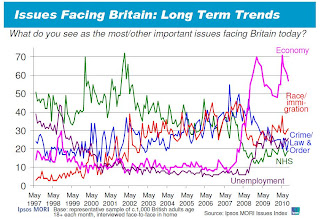However, the Economist (11th September issue) points out that for the public, the overwhelmingly most important issue facing Britain is the economy - concern about the NHS and education is at its lowest point for 25 years, having started to decline as important issues from 2002. Their source is IPSOS Mori. The Economist removed immigration and unemployment from their graph for clarity, but the full one is still interesting:
So, what does this mean for the Conservatives and Liberal Democrats in the coalition government? That as well as communicating their narrative effectively, they need 'a plan for growth' to be part of that narrative, exactly as Ed Miliband and Ed Balls have been pointing out. The government needs to show it understands people's concerns for their jobs and the state of the economy, and that they are doing what they can to help. Measures announced in the Emergency Budget have already been forgotten and could do with being repeated ad nauseam. What else? Well, often, the best thing the government can do for business is to get out of its way! So deregulation or streamlining how regulations work would help take some of the burden off business without spending much public money.
Which reminds me of Reagan's famous quote on the government view of the economy: 'if it moves, tax it, if it still moves, regulate it, if it stops moving, subsidise it'!

No comments:
Post a Comment